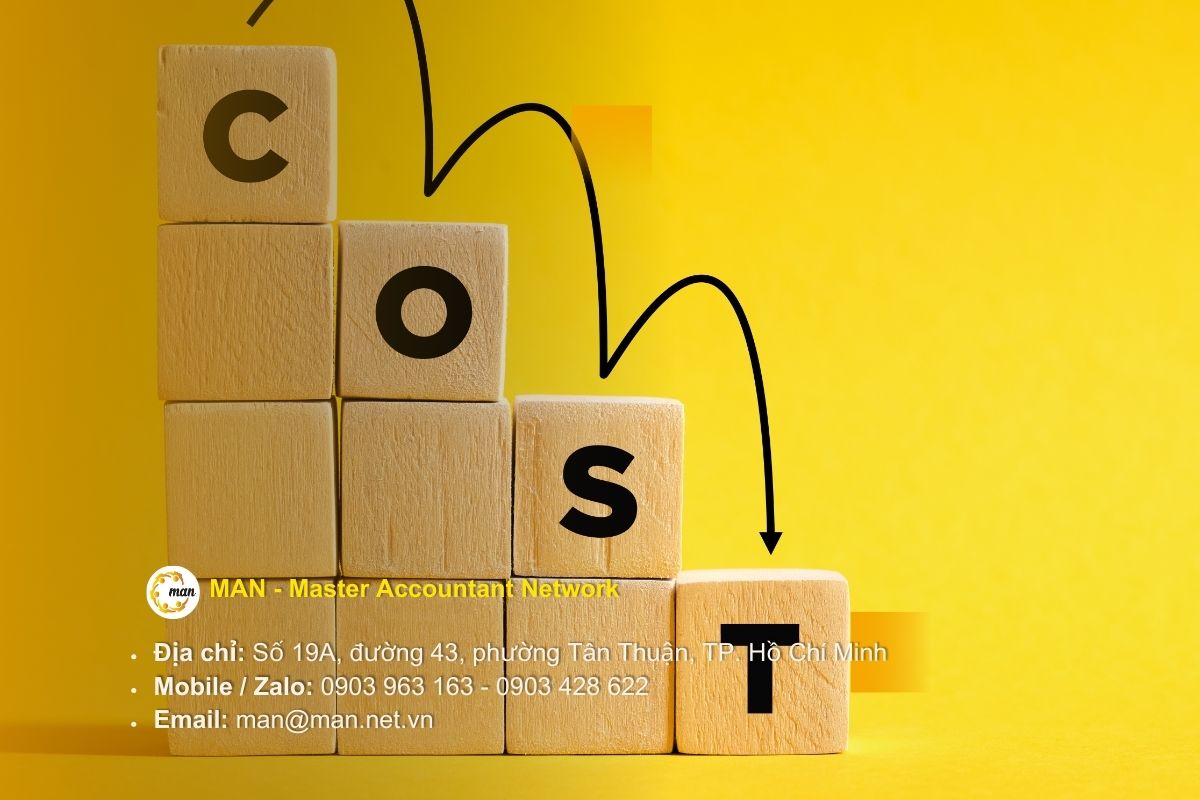In the modern economy, where trade and services play a pivotal role, interest expenses in trade services have become an important measure reflecting the financial health and capital management capacity of enterprises. This is not only an expense arising from borrowed capital but also directly affects profits, the ability to expand scale and transparency in financial statements. Entering 2025, interest expenses in trade services have become a major concern for many enterprises when the interest rate level remains at 6.651 TP3T/year and is commonly in the range of 6.7 - 9.11 TP3T/year. In the context of strong recovery in credit demand, experts predict that interest rates may increase by 0.5 - 0.7 percentage points, posing a significant challenge to the financial strategy of trade services enterprises.
Source: Loan interest rate 2025
The concept of interest costs in trade services

Commercial service interest expenses are all costs incurred by using borrowed capital to serve the business's purchasing, service provision and operation activities (including interest payable to banks, credit institutions, or other lenders).
The Tax Law and related decrees further codify the concept of net interest expense - that is, interest expense after deducting deposit interest and loan interest (if any) to serve as a basis for determining the deductible portion of expenses when calculating taxable income.
How is net interest expense understood?
Net interest expense is the total interest expense of the enterprise minus the income from deposit or lending interest, reflecting the actual cost of borrowing capital after offsetting other interest income. This is an important item in the financial statements, used to calculate the control level of interest expense according to the law, as stipulated in Decree 20/2025/ND-CP.
The role of interest costs in trade in services
To see the importance more clearly, let's join MAN - Master Accountant to learn and analyze the aspects in which commercial service interest expenses directly affect the financial activities and development strategies of the enterprise.
Impact on profits and cash flow
Interest expense directly reduces accounting profit and after-tax profit if allowed to be deducted; at the same time, it is a recurring cash expenditure that affects operating cash flow. For businesses operating in the trade and service sector, where profit margins can be thin, a reasonable level of interest expense determines financial sustainability and scalability.
Impact on corporate income tax (CIT)
Not all interest expenses are deductible in calculating taxable income. Cap rules (% to EBITDA or similar) may exclude some interest from deductible expenses, increasing tax liability. This requires companies to redesign their capital structure if they want to optimize after-tax efficiency.
Role in risk management and financial decision making
Knowing exactly how much of the deductible service interest expense is helps the finance department plan capital, choose capital sources (bank debt, bonds, equity, related loans) and price services and cost of goods sold more accurately. At the same time, interest related to related-party transactions is easily subject to strict checks on reasonableness (arm's length), thus affecting internal pricing policies and loan contracts.
Impact on financial and credit reporting
Debt-to-equity ratio, interest expense and debt service capacity are important indicators for banks and investors when evaluating credit profiles, valuing businesses and making funding decisions. Good management of interest expense in trade services contributes to improving credit scores and reducing overall capital costs.
Legal basis for interest expenses in commercial services

Decree 132/2020/ND-CP is a fundamental document regulating tax management for enterprises with related-party transactions, including detailed regulations on determining and considering the deduction of interest expenses (and documents and criteria to prove the reasonableness of affiliate transactions). Decree 20/2025/ND-CP amends and supplements a number of contents of Decree 132/2020 (effective March 27, 2025). Enterprises need to review which tax period the changes apply from to avoid confusion when making final settlements.
Regarding accounting and capitalization of interest expenses (in case they arise during the process of investment, construction, and asset creation). Accounting and tax guidelines (for example Circular 45/2013 and related guiding documents) specify in detail when interest expenses are capitalized into the original cost of fixed assets and when they must be accounted for as expenses. This directly affects the level of interest expenses in service trade that are included in deductible expenses.
Control regulations
For enterprises with related party transactions, the net interest expense (interest incurred during the period minus deposit interest and loan interest) when calculating corporate income tax is limited to a percentage of EBITDA as prescribed by Decree 132. Currently, this level is applied as 30% of EBITDA (understanding and application according to Clause 3, Article 16 of Decree 132/2020 and implementation instructions).
“(1) The total interest expense after deducting deposit interest and loan interest arising during the period of the taxpayer that is deductible when determining taxable income for corporate income tax shall not exceed 30% of the total net profit from business activities during the period plus interest expense after deducting deposit interest and loan interest arising during the period plus depreciation expense arising during the period of the taxpayer;
(2) The portion of interest expenses not deductible under point (1) shall be carried forward to the next tax period when determining the total deductible interest expenses in case the total deductible interest expenses arising in the next tax period are lower than the level specified in point (1).”
Source : Law Library
Differences in application between trade in services and manufacturing
To see the difference in the application of regulations on interest expenses in the service trade compared to the manufacturing sector, let's look at the comparison table of interest expenses between manufacturing enterprises and service trade enterprises. This table helps enterprises understand the capitalization mechanism, how to calculate EBITDA and the level of risk when exceeding the control threshold of interest expenses.
Board: Comparison applies between trade in services and manufacturing.
| Criteria | Manufacturing and construction businesses | Trade and service enterprise |
| Ability to capitalize interest expenses. | Interest during the investment period can be capitalized into the original cost of fixed assets/work in progress (according to Circular 45/2013/TT-BTC and accounting standards). Capitalization helps reduce interest expenses recorded in the period, limiting the risk of being controlled. | Most of the working capital loans for purchasing goods, paying suppliers, and operating are not capitalized, must be accounted for immediately in the period, and are directly subject to the 30% EBITDA limit. The risk of exceeding the control limit is higher. |
| Cash flow and EBITDA structure. | Usually has large depreciation costs (due to investment in machinery, fixed assets), making EBITDA higher, helping to increase the ability of interest to be deducted. | Seasonal fluctuations in revenue and thin profit margins lead to low EBITDA, resulting in less interest deductions and a high risk of expense exclusions. |
| Affiliate transactions and loan conditions. | If borrowing from an affiliate, documents proving “arm's length” are still required, but the proportion of long-term investment capital is often easier to explain. | Working capital loans from related parties to supplement short-term capital are susceptible to scrutiny. Without records comparing market interest rates, tax authorities may exclude interest expenses in service trade when settling. |
From the comparison table, it can be seen that interest expenses in trade services are often under higher control pressure than manufacturing enterprises due to the characteristics of working capital and thin profit margins. This requires trade services enterprises to build a tight, transparent financial strategy and comply with regulations to both optimize costs and limit tax risks during the settlement process.
How to determine interest costs in commercial services
Determining whether interest expenses in commercial services are tax deductible or not depends closely on tax law provisions and accounting standards.
So what is deductible interest expense?
Deductible interest expenses are the interest arising from loan contracts serving the legitimate production and business activities of the enterprise. The loan must have complete documents and vouchers, be signed transparently, with interest rates and terms appropriate to the market (arm's length). In addition, the deductible interest expense must also be within the control limit according to Decree 132/2020/ND-CP (maximum 30% EBITDA for enterprises with related-party transactions).
What is non-deductible interest expense?
Non-deductible interest expenses include interest arising from transactions that do not serve business activities, loans without valid documents, interest exceeding the 30% EBITDA control level, or interest from related parties but cannot prove reasonableness compared to the market. In addition, interest corresponding to the remaining charter capital (according to the registered capital contribution schedule) is also not included in reasonable expenses.
Principles of reasonable cost classification
To ensure that interest expenses in commercial services are accepted when settling taxes, businesses need to comply with the following principles:
- Principles of valid documents: All loans must have a clear contract, transparent interest rates, and non-cash payment documents (for loans from credit institutions and affiliated parties).
- Principle of suitability for business purposes: Interest expenses are only considered reasonable if they directly serve the business's purchasing, service provision, system operation, etc. activities.
- EBITDA control principle: Apply legal regulations, calculate net interest expense and deductibility limit to avoid being excluded at settlement.
- Principle of transparency of related party transactions: For loans from related parties, there must be documents proving that the interest rate does not exceed or fall below the market level, to ensure compliance with the principle of independent transaction prices.
- Principle of compliance with capital contribution schedule: If the charter capital has not been fully contributed as registered, the interest expense arising on the loan portion corresponding to the missing capital portion will not be included in reasonable expenses.
Thus, determining whether interest expenses in trade services are tax deductible or not depends on the enterprise's compliance with legal principles and accounting standards. Enterprises need to clearly distinguish between deductible interest expenses associated with legitimate business activities, with transparent records and within the 30% EBITDA limit and non-deductible interest expenses, such as in cases of lack of valid documents, interest rates exceeding the market rate or violating capital contribution progress. Correctly applying the principles of documents, capital use purposes, controlling interest expenses, transparency of related-party transactions and charter capital contribution is the key to helping enterprises both ensure compliance with tax laws and optimize financial costs in a sustainable manner.
Common risks in commercial service interest expenses
Although interest expenses in trade services are an important financial tool, helping businesses maintain capital flows and optimize business operations, loose management poses many risks. Especially in the context of tax authorities strengthening supervision of related-party transactions, businesses are prone to significant errors if they do not comply with legal regulations. Some typical risks include:

- Unreasonable related party transactions: Enterprises borrow capital from related parties at unusually high interest rates, without documents proving the economic nature. This expense is easily excluded by tax authorities when finalizing.
- Errors in accounting and declaration: Failure to clearly classify deductible and non-deductible interest expenses according to Decree 132/2020/ND-CP and Decree 20/2025/ND-CP may lead to tax arrears and penalties.
- Borrowing capital from related parties in the trade and service industry: This is a group of transactions that are often tightly controlled by tax authorities, due to the industry's characteristics of high working capital, large financial costs and thin profit margins.
From the above analysis, it can be seen that the management of interest expenses in commercial services is not only limited to the accounting and financial aspects, but is also closely linked to the obligation to comply with tax laws and the requirement of transparency in reporting. The more clearly a business understands the nature and risks, the easier it is to proactively build an effective cost management strategy. This is also an important premise for reaching general conclusions in the conclusion below.
Conclude
Managing interest expenses in trade services is not only a legal requirement, but also a strategy to help businesses optimize financial costs, increase transparency and minimize tax risks. Having a firm grasp of regulations on deductible and non-deductible expenses, and at the same time building a transparent capital management system, will help businesses be more proactive in the context of tax authorities increasingly tightening control over related-party transactions.
To ensure compliance, businesses should consult with consultants, apply for independent audits, and maintain adequate transaction documentation. This is the key to both meeting legal requirements and optimizing business performance.
If your business wants to receive in-depth advice on commercial service interest costs, please contact MAN - Master Accountant Network immediately for support.
Contact information MAN – Master Accountant Network
- Address: No. 19A, Street 43, Tan Thuan Ward, Ho Chi Minh City
- Mobile / Zalo: 0903 963 163 – 0903 428 622
- E-mail: man@man.net.vn
Editorial Board: MAN – Master Accountant Network




